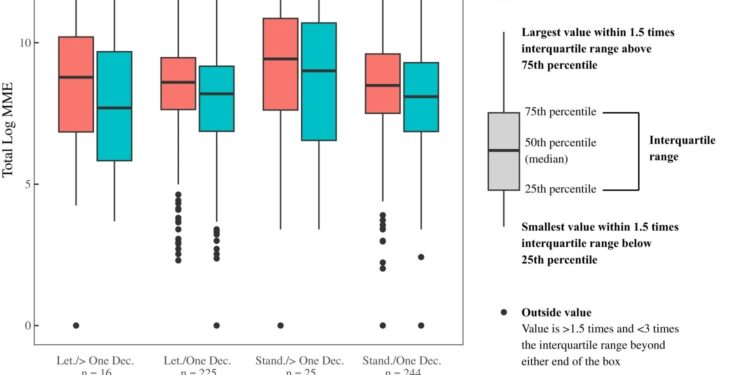Opioid prescribing at the clinician level. Boxplots showing log median MME, interquartile range, and outliers before and after intervention between study groups among clinicians with one or more deaths. Credit: Natural communications (2024). DOI: 10.1038/s41467-023-44573-5
According to a study published today in Natural communication.
Compared to a letter that demonstrated effectiveness in improving prescribing safety, physicians who received notifications with additional scheduling guidance reduced their opioid prescribing by nearly 13%. They also reduced prescriptions for benzodiazepines, anti-anxiety medications, by more than 8%. Together, these medications make up the majority of prescription drug overdoses.
The findings suggest that counseling, known as if/when scheduling prompts, can reduce patient risks by reducing the intensity and frequency of these prescriptions. Results also indicate that letters informing a physician that a patient has suffered a fatal overdose are more effective when they include referral prompts.
The letter with planning prompts asked the doctor to implement a specific plan: “When your next patient presents with pain, keep…(these)…recommendations on hand to help care for them safely. Also be comfortable expressing your concern. about prescribing safety with them so that they are also aware of the dangers associated with scheduled medications.
“Providing doctors with a simple plan that will guide them during a patient visit appears to help moderate their use of these medications,” said Jason Doctor, lead author of the study and co-director of the Behavioral Sciences Program at USC. Schaeffer Center for Health. Politics and economics. “This represents a promising approach to reducing fatal drug overdoses, one that is both affordable and scalable.”
The study builds on two previous ones conducted by the doctor and his colleagues. The first found that doctors reduced opioid prescriptions by 10% within three months of reporting a fatal overdose. A second study found that doctors reduced opioid prescriptions by 7% one year after receiving the notification. The letter used in these previous studies served as a control in this study.
“This latest study is part of a shift toward better understanding how to enact behavior change among physicians whose patients have suffered negative consequences from care provided by the medical community,” said Dr. is also chair of the Department of Health Policy and Management at the USC Sol Price School of Public Policy.
The final randomized study sent letters to 541 clinicians in Los Angeles County: 284 received a standard letter informing them that a patient had died of an overdose; 257 people received a letter with additional instructions.
More information:
Jason N. Doctor et al, A randomized trial examining planning incentives to reduce opioid prescribing, Natural communications (2024). DOI: 10.1038/s41467-023-44573-5
Provided by University of Southern California
Quote: Do you want a safer prescription? Provide doctors with a plan to help patients with pain, study finds (January 12, 2024) retrieved January 12, 2024 from
This document is subject to copyright. Apart from fair use for private study or research purposes, no part may be reproduced without written permission. The content is provided for information only.



